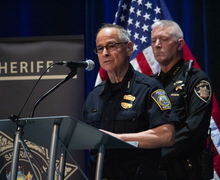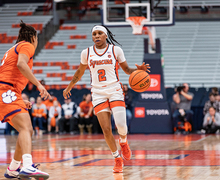SU program that helps students with intellectual and developmental disabilities gets $2 million
Courtesy of SU Photo and Imaging Center
One of the aspects of InclusiveU is the Peer-to-Peer program, which pairs students with disabilities with matriculated students
The Lawrence B. Taishoff Center for Inclusive Higher Education at Syracuse University has been awarded a $2 million grant to further develop its InclusiveU program.
InclusiveU is an initiative to increase access to higher education for students with intellectual and developmental disabilities. The program at SU aims to become a model for other universities, said Beth Myers, director of the Taishoff Center.
The grant for InclusiveU is funded by the United States Department of Education’s Transition and Postsecondary Programs for Students with Intellectual Disabilities program, according to an SU News release.
The grant will go toward the development of programs and research for national use through the InclusiveU program, according to the release.
“There’s a small body of research that has really started looking at best practices,” Myers said.
Part of what the Taishoff Center is doing with InclusiveU is taking principles of universal design for instruction, and also principles of inclusive education at both elementary and secondary levels and changing and applying them to higher education, Myers said.
“(That) traditionally hasn’t been done, particularly because this group has been long excluded from higher ed,” Myers said.
Universal design, Myers said, is the idea of helping faculty members design their classes so they reach the maximum diversity of users, allowing everyone to learn materials.
InclusiveU helps students give their professors a briefing about themselves in terms of what their strengths and needs are in a classroom, she added.
Since its opening two years ago, students have been able to apply to InclusiveU through a separate application process, Myers said. Once they are accepted, students can take up to two courses each semester and will attend SU for two to four years. There are currently 27 students in the program with the majority commuting from the surrounding Syracuse community.
Students in InclusiveU are able to participate in the Peer-to-Peer Project, in which they are matched with matriculated students, Myers said.
“They are getting a very good academic experience, but they weren’t really getting a good socially inclusive experience,” said Dee Katovitch, director of the Peer-to-Peer Project.
InclusiveU students are partnered with one or more matriculated students to improve their engagement socially and on campus, Katovitch said. The students go out for weekly coffee dates, attend events on campus and sometimes become workout partners.
Matriculated students have suggested that InclusiveU students live on campus so that they can more easily be a part of the university’s social life — an initiative that Myers is currently working on.
InclusiveU students audit classes. While they still attend classes, do the work required and receive a grade, students do not earn college credit, Myers said.
“Syracuse University is a fabulously inclusive place and has been really wonderful to our students, and we’ve had many faculty members that are very willing to make adjustments to their assignments so that our students can access the curriculum,” Myers said.
Students are able to take classes in whatever academic area interests them. Rather than receiving a university degree, the students will earn a certificate of completion from InclusiveU, she added.
During a student’s last year at SU they have the option to do another year of courses or participate in Project SEARCH, in which the student will spend the academic year completing three 10-week internships on the SU campus, Myers said.
Myers said InclusiveU wants to work on making sure their students can be independent and support themselves.
“Our goal is for 100 percent of our students to graduate here and get full-time jobs with real pay,” Myers said.
Brianna Shults, internship and employment coordinator for SU, is responsible for coordinating internships on campus as well as teaching students about job readiness skills including time management, dress code and communication.
Students have held internships across campus, from the mailroom to the bookstore, and everyone they have partnered with so far has been very receptive, Shults said.
“It’s really nice to see the integration and how everyone can work together even though things may be done differently and they have to make accommodations for students,” Shults said.
Published on February 8, 2016 at 11:39 pm
Contact Stacy: [email protected] | @StacyFernandezB




